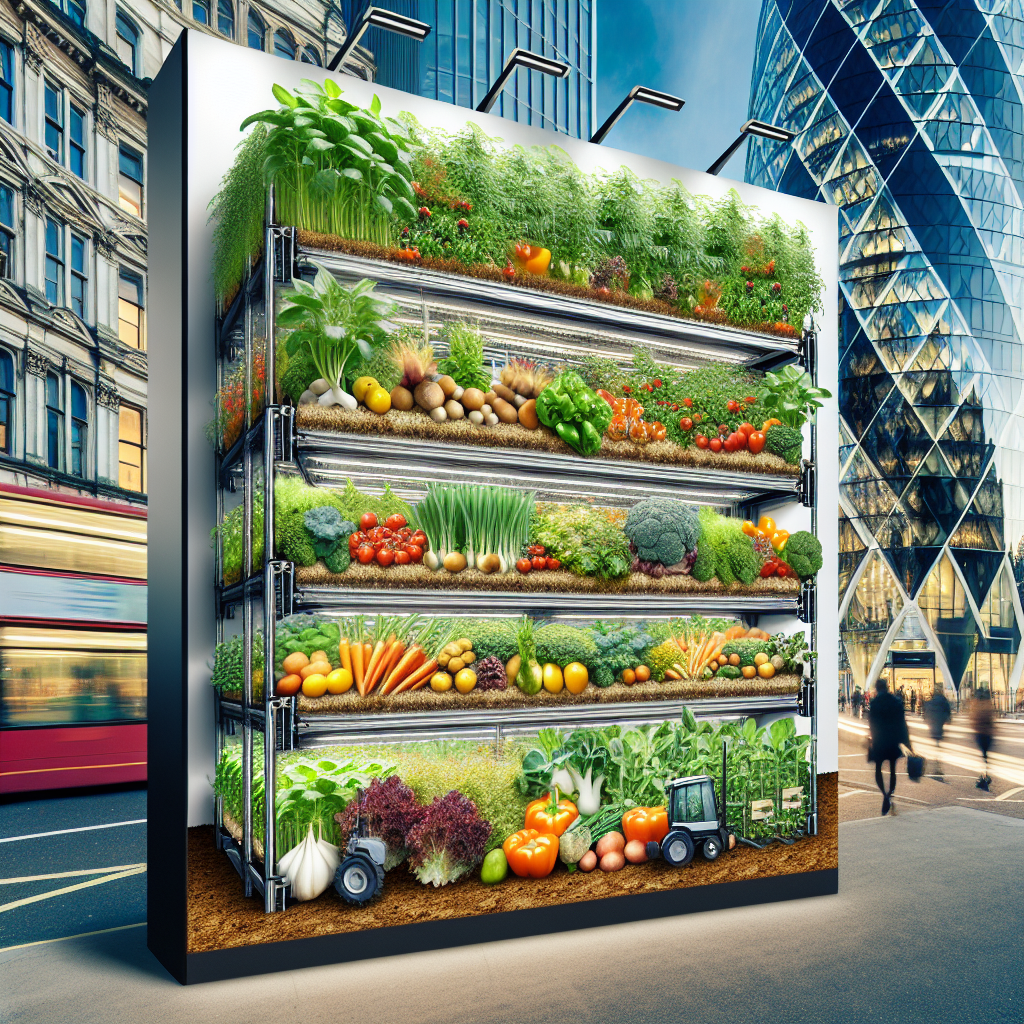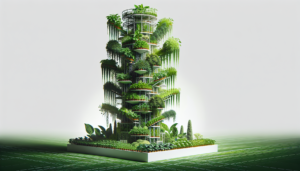
Are you curious about the exciting world of vertical farming and the job opportunities it offers? Look no further! In this article, you’ll discover the fascinating realm of vertical farming jobs in London. From growing fresh produce in urban environments to utilizing cutting-edge technology, these jobs provide a unique and sustainable approach to agriculture. So, hop on board as we take a closer look at the thriving industry of vertical farming in the vibrant city of London. Get ready to be inspired by the innovative work happening right in your backyard!
Benefits of Vertical Farming
Sustainable Agriculture
Vertical farming is a sustainable agricultural practice that offers numerous benefits for both the environment and food production. It involves growing crops in vertically stacked layers, usually in controlled indoor environments, using techniques such as hydroponics or aeroponics. One of the key advantages of vertical farming is its ability to significantly reduce water usage compared to traditional farming methods. By utilizing advanced irrigation and water recirculation systems, vertical farms can minimize water waste and maintain consistent moisture levels for the crops. Additionally, vertical farming eliminates the need for conventional pesticides and herbicides, as the controlled environment prevents the intrusion of pests and diseases.
Year-Round Production
One of the significant advantages of vertical farming is its capacity for year-round crop production, independent of seasonal variations or weather conditions. By providing an artificial environment that optimizes temperature, lighting, and humidity, vertical farms can cultivate crops in any season. This continuous production allows farmers to meet the high demands of consumers throughout the year and reduces the dependence on imported produce during off-seasons. Furthermore, the controlled environment enables the cultivation of specialty or exotic crops that may not be suitable for traditional outdoor farming due to climatic limitations.
Maximized Crop Yield
Vertical farming offers the potential for significantly higher crop yields compared to traditional agriculture methods. By utilizing vertical space, farmers can stack multiple layers of crops, effectively multiplying the growing area. Furthermore, the use of advanced automation systems allows for precise control over factors such as lighting, nutrient delivery, and irrigation, resulting in optimal growing conditions for each individual plant. This level of precision ensures that crops receive the exact amount of resources they need to thrive, maximizing their growth potential and overall yield. With increased crop yield, vertical farms can contribute to food security by providing a reliable and sustainable source of fresh produce.
Space Efficiency
Another major benefit of vertical farming is its space efficiency. In urban areas where land is limited and expensive, vertical farms offer a viable solution for growing food in a compact and efficient manner. By utilizing vertical structures, such as multi-story buildings or hydroponic towers, vertical farms can optimize the use of available space. This efficient use of land allows for the cultivation of a significant amount of crops within a relatively small footprint. Additionally, vertical farming can be implemented in various non-traditional environments, such as abandoned warehouses or underground facilities, further maximizing the utilization of unused spaces within cities.
Types of Vertical Farming Jobs
Vertical Farm Managers
Vertical farm managers are responsible for overseeing the daily operations of a vertical farm. They coordinate and manage all aspects of the farm, including crop planning, staff management, system maintenance, and financial management. Their role is crucial in ensuring the smooth operation and profitability of the farm.
Crop Scientists
Crop scientists play a vital role in developing and optimizing crop varieties for vertical farming. They conduct research to enhance crop growth, improve nutrient requirements, and develop pest and disease management strategies. Crop scientists also analyze data to identify trends and implement advanced cultivation techniques to maximize crop productivity.
Hydroponic Technicians
Hydroponic technicians are responsible for installing and maintaining hydroponic systems in vertical farms. They monitor and adjust nutrient and pH levels to ensure optimal plant growth, inspect and troubleshoot equipment, and handle the harvesting and packaging of crops grown through hydroponics.
Automation Engineers
Automation engineers develop and implement automation systems within vertical farms. They program and maintain sensor networks that monitor environmental factors, optimize energy efficiency, and troubleshoot technological issues. Automation engineers play a crucial role in streamlining operations and improving efficiency within vertical farming systems.
Agri-Business Marketers
Agri-business marketers are responsible for market research and analysis within the vertical farming industry. They develop marketing strategies and campaigns to promote vertical farm products, build and maintain customer relationships, manage sales and distribution channels, and oversee branding and product positioning efforts.
Quality Control Specialists
Quality control specialists ensure that the crops grown in vertical farms meet the required quality standards. They implement quality control procedures, test and monitor crop quality, troubleshoot quality issues, and maintain documentation and compliance with relevant regulations. Quality control specialists play a crucial role in maintaining the high-quality standards necessary for vertical farming.
Vertical Farm Designers
Vertical farm designers are responsible for designing the layout of vertical farms. They optimize space utilization and workflow, select and source equipment, and collaborate with architects and engineers to ensure compliance with building codes. Vertical farm designers play a key role in creating efficient and effective growing environments for vertical farming operations.
Plant Scientists
Plant scientists in vertical farming focus on conducting research to enhance crop growth and productivity. They study plant physiology, genetics, and breeding to develop new crop varieties that are well-suited for vertical farming. Plant scientists also work on optimizing crop nutrition and developing sustainable cultivation techniques.
Crop Harvesters
Crop harvesters are responsible for assisting in crop cultivation and harvesting. They monitor crop growth, ensure proper irrigation and nutrition, and assist in the efficient and timely harvesting of crops. Crop harvesters play a crucial role in maintaining crop quality and meeting production targets.
Vertical Farm Technicians
Vertical farm technicians are responsible for the day-to-day monitoring and maintenance of vertical farming systems. They troubleshoot equipment and system issues, implement safety and quality standards, and assist in crop cultivation activities. Vertical farm technicians play a vital role in ensuring the smooth operation and performance of vertical farming systems.
Vertical Farm Manager Roles and Responsibilities
Overseeing Daily Operations
As a vertical farm manager, your primary responsibility is to oversee the daily operations of the farm. This includes monitoring and managing all aspects of crop production, automation systems, and maintenance protocols. You will need to ensure that all tasks are performed efficiently and on schedule, coordinating with various teams and ensuring adherence to quality standards.
Crop Planning and Management
One of your essential roles as a vertical farm manager is crop planning and management. You will be responsible for developing crop production schedules, determining crop varieties, and coordinating seeding, transplanting, and harvesting activities. Effective crop planning is crucial for maintaining consistent production and managing inventory levels to meet market demand.
Managing Farm Staff
As a vertical farm manager, you will be responsible for managing and supervising the farm staff. This includes overseeing recruitment, training, and scheduling, as well as providing guidance and support to ensure that tasks are performed effectively. Effective team management is essential for maintaining a motivated and productive workforce.
Monitoring and Maintaining Vertical Systems
Another crucial aspect of your role as a vertical farm manager is monitoring and maintaining the vertical farming systems. This includes regularly inspecting and troubleshooting equipment, ensuring proper functioning of climate control systems, and maintaining optimal growing conditions for the crops. Regular maintenance and monitoring are essential for preventing system failures and ensuring smooth operations.
Budgeting and Financial Management
As a vertical farm manager, you will be responsible for budgeting and financial management. This includes developing and monitoring the farm’s budget, tracking expenses, and optimizing resource allocation to ensure profitability. Financial acumen and the ability to make informed decisions regarding resource allocation are essential for successful vertical farm management.
Sustainability and Environmental Compliance
Vertical farming places a strong emphasis on sustainability and environmental compliance. As a vertical farm manager, you will need to implement sustainable practices and ensure compliance with relevant environmental regulations. This may include managing waste disposal, implementing energy-saving measures, and exploring renewable energy sources.
Supply Chain Management
Effective supply chain management is crucial for the success of a vertical farm. As a manager, you will be responsible for overseeing the procurement of inputs, managing inventory levels, and ensuring timely delivery of products to customers. Efficient supply chain management is essential for maintaining consistent production and meeting customer demand.
Crop Scientist Roles and Responsibilities
Developing Crop Varieties
As a crop scientist in vertical farming, your key responsibility is to develop and improve crop varieties suitable for vertical farming. You will conduct research to enhance crop growth, optimize nutrient requirements, and breed new varieties with desirable traits such as greater yield, disease resistance, or flavor. Your work will contribute to the continuous improvement and innovation in vertical farming practices.
Optimizing Crop Growth and Nutrient Requirements
Crop scientists are responsible for optimizing crop growth and nutrient requirements within vertical farming systems. You will conduct experiments and studies to determine the optimal nutrient composition, pH levels, and growing conditions for different crop varieties. This knowledge will be crucial in maximizing crop productivity and ensuring nutritional quality.
Pest and Disease Management
Effective pest and disease management are essential for maintaining healthy crops in vertical farms. As a crop scientist, you will develop and implement strategies to prevent and control pests and diseases. This may involve the use of biological controls, integrated pest management techniques, or the development of resistant crop varieties.
Researching and Implementing Advanced Cultivation Techniques
Crop scientists play a crucial role in researching and implementing advanced cultivation techniques within vertical farming systems. This may include studying the impact of specific lighting regimes, manipulating environmental factors, or optimizing irrigation and fertigation practices. Your research findings will contribute to improving the efficiency and sustainability of vertical farming practices.
Analyzing Crop Data
As a crop scientist, you will collect and analyze crop data to identify trends, evaluate crop performance, and enhance cultivation practices. This may involve analyzing yield data, nutrient uptake, water usage, or pest incidence. Your expertise in data analysis will provide valuable insights for optimizing crop growth and production within vertical farming systems.







